Abbreviations
AQW Assembly Question (written)
BDA British Deaf Association
COVID-19 Coronavirus
CRM Customer Relationship Management
CPD Continuing Professional Development
DA Disability Assessor
DfC Department for Communities
DLA Disability Living Allowance
DoJ Department of Justice
DWP Department for Work and Pensions
FME Further Medical Evidence
GB Great Britain
GP General Practitioner
HAA Health Assessment Advisor
IHP Independent Health Professional
IT Information Technology
KPI Key performance indicator
LCF Living Costs and Food Survey
LCNI Law Centre NI
MOU Mail Opening Unit
MR Mandatory Reconsideration
NAO National Audit Office
NI Northern Ireland
NIAO Northern Ireland Audit Office
NICTS Northern Ireland Courts and Tribunals Service
NIHRC Northern Ireland Human Rights Commission
NIPSO Northern Ireland Public Services Ombudsman
NMC Nursing and Midwifery Council
OBR Office for Budget Responsibility
PAC Public Accounts Committee
PIP Personal Independence Payment
PIPAG PIP Assessment Guide
PIPCS PIP Computer System
PSA Professional Standards Authority for Health and Social Care
QAM Quality Assurance Manager
RHI Renewable Heat Incentive
SC Service Credit
SRO Senior Responsible Officer
TAS The Appeals Service
UK United Kingdom
Key Facts
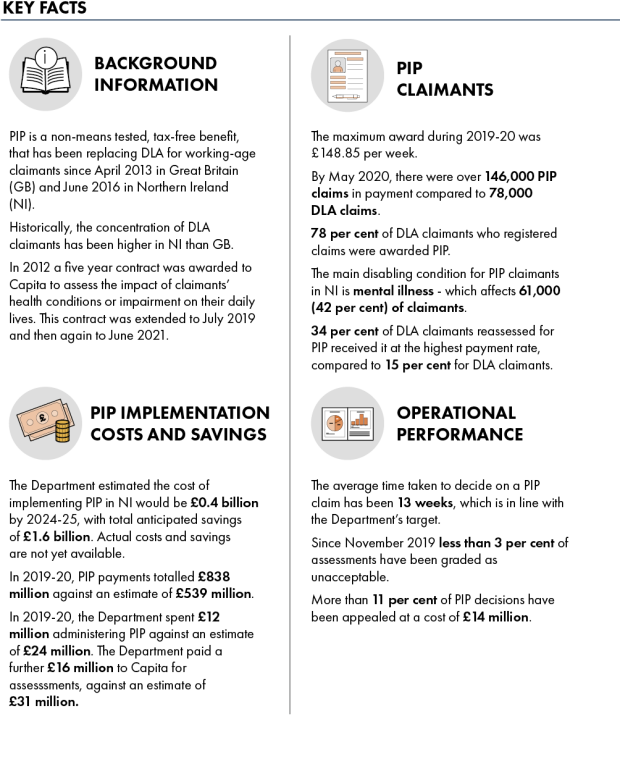
Executive Summary
Introduction to Personal Independence Payment (PIP)
1. In 2019, we reported on the implementation of welfare reforms in Northern Ireland. One of the key reforms we referred to was the replacement of Disability Living Allowance (DLA) for working-age claimants with Personal Independence Payment. Reform of DLA is part of the Westminster Government’s wider objective of building a welfare system based on the principles of fairness and responsibility, which protects the most vulnerable and is financially stable.
2. DLA is of particular significance in Northern Ireland, where one in nine of the population claimed this benefit compared to one in twenty in Great Britain. Concerns over the impact of welfare reforms on vulnerable claimants led to the Northern Ireland Executive allocating £600 million from the NI Block Grant for the four years ending 2020 to mitigate the impact of potential reductions in payments. Twenty per cent of these mitigation payments were ear-marked for claimants transferring from DLA to PIP who may be worse off.
3. PIP is for working-age people (16 to 64 years) and is designed to help those with disabilities or long-term health conditions live more independently by supporting those in greatest need. It is based on the claimant’s ability to complete certain activities. Many claimants face long-term health conditions including physical, sensory, mental, cognitive or intellectual difficulties, or any combination of these. The Department for Communities (the Department) administers and awards claims for PIP but pays a private sector contractor, Capita, to assess the impact of claimants’ health conditions on their daily life by face-to-face assessments or through a paper-based review.
4. Benefit-related spend is funded by HM Treasury whereas the cost of administering benefits is funded by the NI Block Grant. The Department uses Information Technology (IT) systems developed by the Department for Work and Pensions (DWP) to administer benefits within Northern Ireland, rather than spending money on developing and maintaining its own systems. As a result, the Department is heavily reliant on DWP systems for administering benefits to claimants.
5. In 2016 the Department estimated that it would cost £0.4 billion to implement PIP, with total anticipated benefit savings of £1.6 billion. As well as these estimated financial savings, the government’s policy objective includes making this benefit easier to understand, more efficient to administer and providing better support to people with disabilities facing the greatest challenges in remaining independent and participating fully in society.
6. The Department has been rolling out PIP across Northern Ireland on a phased basis since June 2016 and by February 2019 had invited all DLA working-age claimants to be reassessed to see if they were eligible for PIP. In 2019-20, claimants were paid £838 million for PIP against an estimate of £539 million and £432 million for DLA against an estimate of £401 million. The following Figure provides further details of expenditure on these benefits since 2015-16.
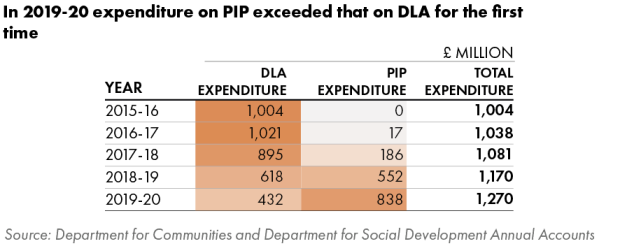
7. In March 2016, the Department estimated in its outline business case that it would incur £111 million of costs in administering the PIP contract and pay Capita £140 million for completing the assessments over the four years to March 2020. By 2019-20 the Department had spent £43 million on administering PIP, significantly less than estimated, largely due to the level of appeals not being as high as expected. When DWP rolled out the PIP contract in GB in April 2013, there were considerable issues with delivery which led to contracts being re-negotiated. The Department subsequently re-negotiated its contract with Capita and costs were revised, resulting in Capita being paid £88 million for assessments, also less than estimated.
Scope of NIAO report
8. This report focuses on the Department’s management of the Capita contract and how PIP has been delivered. We adopted a variety of methods during our review and these are explained in more detail at Appendix 1.
9. We have specifically not looked in detail at the processes for gathering and applying further evidence in the PIP benefit decision-making and dealing with internal complaints. This is because this area is currently being investigated by the Office of the Northern Ireland Public Services Ombudsman (NIPSO) which is expected to report shortly.
Key findings
Value for money
10. It is too early to assess if the implementation of PIP will meet its objectives but it is likely to cost more than DLA. Spending on disability benefits has continued to rise significantly in GB even after the introduction of PIP. A recent NIHRC report highlighted that households in Northern Ireland with more functional disabilities and on lower incomes have also gained in net income. Furthermore it noted that, in terms of benefits wider than PIP, families with disabled children are worse off. Local flexibilities, including mitigation payments, have also been introduced in Northern Ireland. While savings in benefit expenditure have not yet been assessed by the Department, in our opinion, the move to PIP is likely to end up costing more, not less.
Delivery of the contract
11. The Department has replaced DLA for working-age claimants with PIP across Northern Ireland under budget and close to timetable without the extensive issues experienced in GB. DWP, which has been rolling out PIP in GB since April 2013, has been criticised for its approach by both the National Audit Office (NAO) and Westminster committees. PIP was delayed in Northern Ireland until June 2016, due to a lack of political consensus. This delay has given the Department the opportunity to learn from DWP’s experience. As a result, the process of rolling out PIP in Northern Ireland has been much smoother and claimants have not experienced such significant delays.
12. Capita has met a number of the targets set out in its contract with the Department. Until September 2018, Capita struggled to achieve the key targets of quality (no more than 3 per cent of assessments should be graded as unacceptable) and clearance of referrals within contractual targets although recently it has been meeting both of these targets.
13. Performance against the quality target varied between two per cent and four per cent from September 2018 until November 2019 (apart from a spike of nearly five per cent in October 2019). However, by early 2020 Capita was achieving a rate below three per cent.
14. In July 2019, 78.6 per cent of referrals were being cleared within 40 working days against a target of 98 per cent. Since August 2019, Capita has met the revised target of clearing cases within an average clearance period of 35 working days. We note the Office for Budget Responsibility’s comments in 2019 that the quality of reports is not a measure of the quality of assessments. There is potential for a trade-off between the time taken for an assessment and time for writing the report - undue emphasis on report quality could impact on the quality of the assessment.
Management of the contract
15. We assessed how the Department managed the contract against best practice. It is important to note that the NAO has acknowledged that, while complying with best practice should help with contract management, it may not be enough to achieve value for money. The Department has generally managed the contract in line with good practice. The key exceptions are that it relies on Capita to provide it with the information used to manage its performance and it does not formally benchmark against services provided by DWP’s private sector contractors. DWP originally planned to provide IT software for PIP assessments. In its absence, both DWP and the Department have to rely on Capita’s management information systems. We have made recommendations on these matters below.
16. While the Department does validate Capita’s management information where possible, the Department’s Internal Audit has acknowledged that only limited validation can be undertaken until IT systems are fully developed.
Other findings
17. Underspend in mitigation payments. The Department paid out £73 million (60 per cent) of the £121 million set aside to mitigate against claimants losing out as a result of the move to PIP. The Department has attributed this to the lower than forecast rate of appeals.
18. Since the contract was reviewed, the average cost per assessment has increased by over 35 per cent. In GB, the contract was not delivered as anticipated as the basis for DWP assumptions provided to the contractors was incorrect. For example, the number of cases overall (and those requiring face-to-face assessments) was higher than expected and the time taken to undertake an assessment was underestimated. The Department followed DWP’s approach of reviewing the contract to ensure quality issues were resolved and it remained economically viable. The Department told us that even though the contract value, and therefore the cost per assessment, has increased, the level of profit which Capita is making from the contract has been retained at the level set at contract award. We have seen evidence of the Department adopting a commercial approach in its negotiations with Capita.
19. Capita has achieved an overall average satisfaction rate of 98 per cent since May 2017. As part of the contract, Capita is required to pay for surveys to be carried out on the service it provides before the Department makes its decision on a claim. We have made a recommendation that the Department considers how it can strengthen the independence of the survey process.
20. The majority of reconsiderations result in no change to the amount awarded. By the end of May 2020, MRs were completed for around 60,000 (27.4 per cent) of 219,440 decisions taken. Twenty per cent of these MRs resulted in the award being amended which means that just over five per cent of awards to date have been changed.
21. On average, 11.5 per cent of decisions on PIP claims have been appealed since June 2016 and nearly one-third of these have been successful. This represents nearly four per cent of all decisions made. The Department attributes the majority of overturns of decisions at appeal to the tribunal panel receiving further medical evidence not provided to its Case Managers. Clearly if further medical evidence is available earlier in the claims process then the decision is more likely to be correct, the Department will not incur the additional costs of reconsiderations and appeals and claimants will not experience the unnecessary stress of taking their claims through these stages. This is an important point and is being looked at in further detail by NIPSO. It was also one of the key areas of focus in the second independent statutory review.
22. The average PIP appeal costs £545 and with over 25,000 appeals to date, costs since April 2017 are estimated to be nearly £14 million. The Department had estimated a cost of £341 per appeal and told us that actual costs have been higher because of the high postponement/ adjournment rate due to the need to comply with new data protection regulations since April 2019.
23. Decision-making could be improved if the appeals feedback process was enhanced. The main source of feedback for the Department is the President of Appeals Tribunal NI’s Annual Report. Appeals tribunals are independent judicial bodies and we recognise their decisions and judicial functions are outside our remit. We note, however, that the most recent Annual Report referred to appeals that took place in 2016-17. We have made a recommendation that the Annual Report should be completed sooner.
24. Detailed information on appeals statistics is not publicly available in Northern Ireland. We have made a recommendation that such information should be publicly available, as is the case in GB.
25. The Law Centre (Northern Ireland) considers that advice at an early stage is crucial for claimants. It advised of a number of successful cases where it had assisted appellants in gathering additional medical evidence, which led to their cases not going to tribunal. In our view, it is likely that claimants receiving assistance from voluntary and community bodies when going through the PIP process should be making fewer appeals.
Recommendations and associated findings
|
Para. |
Finding |
Recommendation |
|---|---|---|
|
2.16 |
Capita currently pays for surveys to be carried out on the service it provides before the Department makes its decision on a claim. We found it unusual that the Department does not commission and pay for these surveys directly. Moreover, the timing of the survey may lead to vulnerable claimants not fully reflecting their views on the entire service provided by Capita. |
1: The Department needs to strengthen its system for surveying claimants, to ensure the process is perceived as independent and fully reflects claimants’ views. |
|
4.22 and 4.23 |
The most recent Annual Report issued by the President of Appeals Tribunal NI referred to appeals that took place in 2016-17. The significant time lapse between the year end and the publication of this Annual Report has been highlighted in previous NIAO reports in both 2005 and 2009. The Public Accounts Committee also recommended that the President’s Annual Report should be published within six months of the end of the year to which it relates. |
2: While we recognise that attempts have been made to resolve these issues, it is disappointing that recommendations made 10 years ago by the Public Accounts Committee and ourselves relating to appeals have yet to be addressed. We reiterate the comments made by the Independent Reviewer of the Work Capability Assessment in 2014, that the Department and The Appeals Service (TAS) need to work together to improve decision-making. |
|
4.26 |
The Ministry of Justice publishes official statistics relating to all tribunals, including social security, every quarter in GB but such information is not available in the same detail in Northern Ireland. |
3: To achieve transparency and promote public confidence, detailed information on all tribunals (including social security), should be publicly available in NI, as is the case in GB. |
|
5.4.7 |
In line with DWP practice, the Department relies on Capita to provide it with the information used to manage contract performance. |
4: In future contracts, the Department should have a robust information system in place for managing contract performance, rather than relying on the contractor to provide key information. |
|
5.6.3 |
The Department does not formally benchmark the services it receives from Capita against those provided to DWP by its contractors. |
5: We accept that there may be some differences between the PIP contracts operating in GB and NI. In our view, it would be good practice for future contracts to allow for the formal sharing of information for benchmarking purposes, which should help improve performance. |
Part One: Introduction
Personal Independence Payment has replaced Disability Living Allowance for working-age claimants
1.1 The Department for Communities (the Department) administers a range of benefits and allowances for people unable to work or needing help due to ill health or disability. One of these benefits is Disability Living Allowance (DLA), a tax-free, non-means tested benefit for people with disabilities who need help with mobility or care costs.
1.2 DLA was not fundamentally reviewed until 2010, eighteen years after it was introduced, when the Westminster Government considered the rising number of claimants and associated benefit expenditure to be unsustainable. Other issues with DLA included the assessment criteria focusing on care and mobility needs rather than an individual’s ability to carry out everyday activities; the complexity of the benefit; and no formal process to review indefinite (lifetime) awards, resulting in potentially inaccurate awards or over and under payments of benefits.
1.3 In June 2010 the Westminster Government announced:
- its intention to reform DLA “to ensure support is targeted on those with the highest medical need”; and
- the introduction of “objective medical assessments” for all DLA claimants from 2013-14, to ensure payments were only made as long as a claimant needed them.
1.4 The Department started rolling out Personal Independence Payment (PIP), a new non-means tested and tax-free benefit, in Northern Ireland in June 2016 on a phased basis. All existing DLA claimants were invited for reassessment by the end of February 2019. This benefit is for working-age people (16 to 64 years) and is designed to help people with disabilities or long-term health conditions live more independently, by supporting those in greatest need. Claimants under the age of 16 and those aged 65 and over on 20 June 2016 will receive DLA, provided they continue to meet the eligibility criteria. Appendix 2 compares the characteristics of PIP with DLA.
1.5 The Department estimated the cost of implementing PIP in Northern Ireland would be £0.4 billion by 2024-25, with total anticipated benefit savings of £1.6 billion. As well as these estimated savings, the government’s policy objective includes making PIP easier to understand and more efficient to administer, providing better support for people with disabilities who face the greatest challenges in remaining independent and participating fully in society.
1.6 Social security is a devolved matter and under the long established parity principles, individuals in Northern Ireland receive the same level of benefit and follow the same qualifying conditions around entitlement as those in GB. Benefit-related spend is funded by HM Treasury whereas the cost of administering benefits is funded by the NI Block Grant. The Department uses the Information Technology (IT) systems used by the Department for Work and Pensions (DWP) to administer benefits within Northern Ireland, rather than incurring the costs of developing and maintaining its own IT systems. PIP has been rolling out in GB since April 2013 but was delayed in Northern Ireland due to a lack of political consensus. Further detail is available in our 2019 report on welfare reform. Figure 1 sets out the different dates for the rollout of PIP in Great Britain and Northern Ireland.
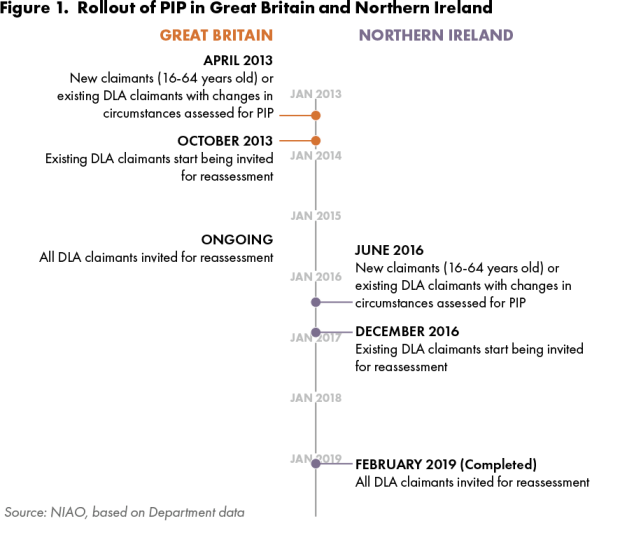
1.7 In 2019-20, the Department paid out £432 million on DLA claims (2018-19: £618 million) against an estimate of £401 million and £838 million on PIP claims (2018-19: £552 million) against an estimate of £539 million. Figure 2 provides further detail of expenditure on these benefits since 2015-16.
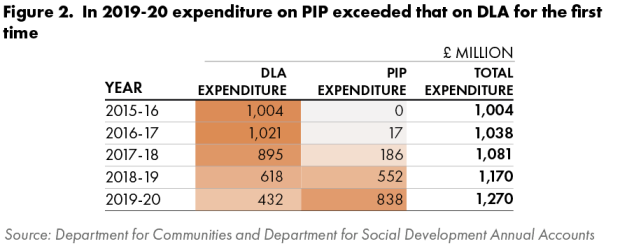
1.8 In March 2016, the Department estimated in its outline business case that it would incur £111 million of costs in administering the contract and pay Capita £140 million for completing the assessments from June 2016 to March 2020. By 2019-20 the Department had spent £43 million on administering PIP, significantly less than estimated, largely due to the level of appeals not being as high as expected. When DWP rolled out the PIP contract in GB in April 2013, there were considerable issues with delivery which led to contracts being re-negotiated. The Department subsequently re-negotiated its contract (see Part Two) and costs were revised, with Capita being paid £88 million for assessments. Figure 3 compares actual and budgeted spend.
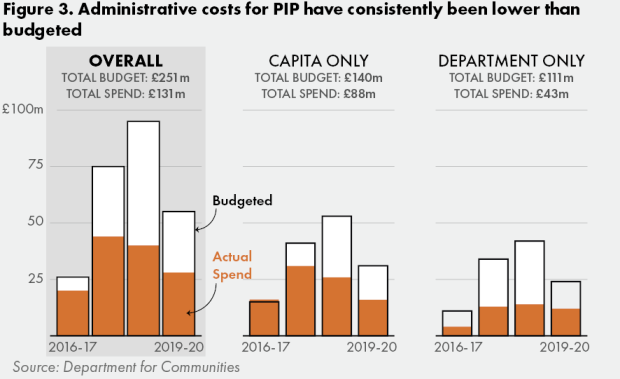
PIP is based on a claimant’s ability to complete activities
1.9 Claimants on DLA with indefinite or lifetime awards are not automatically entitled to PIP. A fundamental element of the new benefit has been the introduction of an independent assessment of need. The majority of awards are now fixed term with regular assessment periods.
1.10 The level of entitlement to PIP depends on the extent to which the claimant’s long-term health condition or disability affects their ability to manage daily activities or mobility, for example, their ability to dress and undress or communicate. The PIP award comprises two components, a daily living and a mobility component, payable at either a standard or an enhanced rate. The process is more streamlined for terminally ill claimants with less than six months to live.
The Department decides whether claimants are awarded PIP
1.11 The Department administers and awards claims for PIP but pays a private sector contractor to assess claimant’s needs. If claimants do not agree with the Department’s decision, they can ask for it to be reconsidered. The reconsideration process, known as Mandatory Reconsideration (MR), provides the claimant with the opportunity to ask the Department to review its decision and provide further evidence. If the claimant is not content with the outcome of the MR, they can lodge an appeal through The Appeals Service (TAS). Appeal hearings are held by an independent tribunal.
Capita completes assessments for the Department
1.12 In 2012, a five year contract was awarded to Capita to assess the impact of the claimant’s health condition or impairment on their everyday life. However, the delay in introducing welfare reform measures in Northern Ireland led to the PIP assessment service not being operational until June 2016. Subsequently, the contract with Capita was extended to July 2019 then again to July 2021 in line with the GB contract.
1.13 Capita employs approximately 120 independent health professionals (IHPs) in Northern Ireland to carry out assessments. The IHPs conduct either face-to-face assessments or paper-based reviews, if they consider that the documentation provided by claimants provides sufficient evidence and is in line with the criteria set by the Department. The majority of assessments (approximately 85 per cent) are face-to-face and carried out in an assessment centre or claimants’ homes. The Department originally estimated that the level of face-to-face assessments would be lower at 75 per cent, in line with DWP estimates. This was later revised to 86 per cent after the original contract was reviewed. We note that face-to-face assessments take longer to complete and Capita is penalised if it does not meet contractual clearance times set by the Department.
1.14 We asked the Department if it was satisfied that the number of face-to-face assessments carried out was necessary, given that higher fees are payable for them. The Department told us that, at initial review, Capita determines on a case by case basis how an assessment should be conducted. Furthermore, the Department conducts independent monthly audits on a random sample of assessments and is satisfied that Capita is adhering to the process outlined in the PIP Assessment Guide.
Flexibilities have been introduced in Northern Ireland
1.15 The Department has introduced a number of unique flexibilities in Northern Ireland, including home visits to claimants who do not make a claim as part of the reassessment process, utilising existing medical evidence provided for DLA if the claimant requests them to do so and working collaboratively with the Victims and Survivors Service to share relevant evidence they hold on their claimants, subject to claimant consent.
1.16 Concerns over the impact of welfare reforms on vulnerable claimants led to the Northern Ireland Executive allocating approximately £600 million from the NI Block Grant, for the four years ending 2020, to “top up” potential reductions in benefit payments. Twenty per cent of this allocation was for claimants transferring from DLA to PIP. The Department has paid out £73 million (60 per cent) of the £121 million set aside for this, as set out in Figure 4. The Department told us that expenditure was below budget in both 2018-19 and 2019-20 due to the appeal rate being lower than forecast.
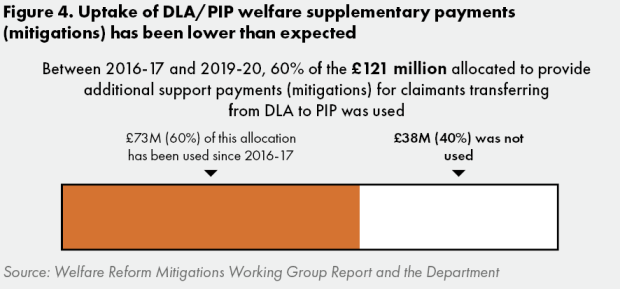
1.17 If a DLA claimant is reassessed and receives either a reduced or nil award, their case is automatically referred to a team in the Department who assess if they are entitled to a welfare supplementary payment, payable for a maximum of a year. A recent Westminster Inquiry examined the impact of welfare policy in Northern Ireland and suggested extending this mitigation scheme and introducing mitigation for 16 year olds transitioning from DLA to PIP.
DWP has faced criticism for its approach in implementing PIP
1.18 DWP introduced PIP through a phased introduction starting in April 2013. In 2014 NAO examined DWP’s progress in implementing PIP. Key findings included:
- backlogs had developed by mid-2013;
- the volume of claims transferred to the assessment providers was nearly three times what had been expected;
- DWP did not leave enough time to test whether it could handle a large volume of claims;
- actual performance varied considerably from operating assumptions; and
- DWP relied on assessment providers’ assurances about their readiness to deliver.
“DWP did not leave enough time to assess potentially foreseeable problems with its own and providers’ performance before rolling out successive phases of assessments”. NAO, 2014
1.19 The Westminster Public Accounts Committee (PAC) was also critical of DWP’s approach to implementing PIP:
“DWP rushed the introduction of PIP and did not pilot the benefit process. Many disabled people have experienced long and unacceptable delays in their PIP being assessed and granted.” Westminster PAC, 2014
1.20 The Committee noted that many claimants experienced delays of over six months for decisions. The delay in introducing PIP in Northern Ireland has given the Department the opportunity to learn from DWP’s experiences. Assumptions made about the number and timing of claims underpinning the business case for PIP were updated to take account of DWP’s experience. The Department advised us that significant collaborative work was carried out between the Department and Capita in developing and enacting an implementation plan to avoid a repeat of the delays in GB. As a result, while the average cost per assessment increased by over 35 per cent, claimants in Northern Ireland have not experienced such significant delays.
There is a higher incidence of DLA claimants in Northern Ireland compared to Great Britain
1.21 Historically, there has been a higher concentration of DLA claimants in Northern Ireland than in GB. The number of DLA claimants at August 2016 was approximately 214,000, which represented around one in nine of the population (in the rest of the UK, one in twenty claimed DLA, although rates in Wales were comparable with Northern Ireland). Seventy-five per cent or 160,000 of these claimants had indefinite awards. With the rollout of PIP, by May 2020, the number of DLA claimants in Northern Ireland dropped to approximately 78,000, with 1,100 of them falling within the working-age category.
1.22 As noted in Figure 1, all new and existing DLA working-age claimants, reporting a change in circumstances, have been assessed for entitlement to PIP since June 2016. The process of inviting existing working–age claimants with an indefinite (lifetime award) for reassessment started in December 2016 and was completed by mid-February 2019, six weeks later than planned. By May 2020, there were over 146,000 PIP claims in payment. Figure 5 shows the trends in the number of DLA and PIP recipients in Northern Ireland since November 2016.
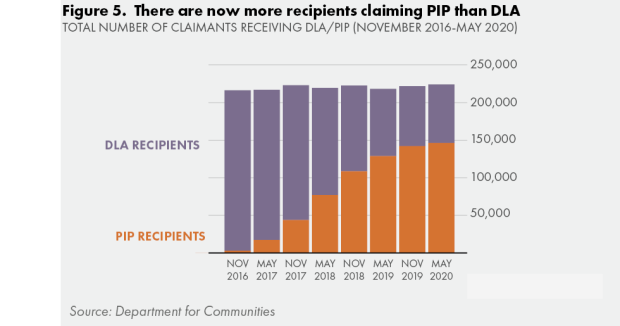
PIP is no longer expected to generate financial savings in Great Britain
1.23 The 2010 Budget anticipated financial savings of £1.4 billion a year across the UK by 2015-16 from introducing PIP. This assumed that PIP would be fully rolled out by then and that the number of claimants would have reduced sufficiently to reduce spending by 20 per cent less than it would have been with no changes to DLA.
“By 2017-18, PIP had in fact increased spending by around 15 to 20 per cent compared to DLA if it were still operational with roll out being only two-thirds complete.” Office for Budget Responsibility, 2019
1.24 A 2019 Report by the Office for Budget Responsibility (OBR) concluded that the effects of major reforms on spending are hard to predict and subject to the risk of optimism bias. The OBR has revised spending forecasts upwards due mainly to:
- volumes of new claims for PIP being higher than they were for DLA;
- reassessment volumes being lower than expected; and
- success rates and average awards for new claims and reassessments being higher than expected.
1.25 DWP’s interpretation of PIP legislation has also led to several legal challenges being raised against it. Where legal challenges have been successful, DWP has carried out administrative exercises to identify affected claimants and backdate benefit payments to the date of the original judgement. In such cases, the Department also applies the principle of the judgement. For example, on 28 June 2018 the Department started an administrative exercise reviewing existing PIP claims to check if recipients were entitled to more support as a result of two Tribunal judgements in GB. By January 2020, the Department had reviewed over 67,000 claims. Arrears were paid out in 830 of the cases, at an average additional payment of £3,600, totalling approximately £3 million. Policy changes by DWP are also likely to impact on estimated financial savings, for example, in March 2019 the Government announced that regular reviews of PIP awards for claimants at or above state pension age would not be undertaken unless claimants report a change in needs.
1.26 The situation in Scotland has also changed with the transfer of new social security powers to the Scottish Parliament. The Scottish Government was due to take full responsibility for paying out eleven benefits previously administered by DWP from April 2020. These include the ill health and disability benefits of DLA and PIP that the Scottish Government intends to replace with a new benefit, Adult Disability Payment.
It is too early to assess if the implementation of PIP will meet its objectives
1.27 Many of the deficiencies in DLA (noted at paragraph 1.2) have been addressed through the design of the PIP benefit which has a greater focus on how individuals carry out daily activities and has a formal process to review most awards. The combination of rates payable has also reduced from eleven to eight.
1.28 The Department worked closely with DWP to ensure the introduction of PIP in Northern Ireland. It met its deadline of introducing PIP for new working-age claimants from 20 June 2016 and invited all eligible DLA working-age claimants for reassessment by mid-February 2019, six weeks later than planned. One of the potential benefits identified by the Department was savings in benefits expenditure, which has not yet been assessed.
1.29 However, the number of claimants in Northern Ireland has risen from 214,000 DLA claimants in August 2016 to a total of 224,000 DLA and PIP claimants in May 2020 (an increase from one in nine to one in 8.5 of the population). The rate has also increased in GB, with one in seventeen now claiming either DLA or PIP.
1.30 Furthermore using the OBR finding that PIP is costing 15 per cent more than DLA would have done as an assumption, a recent Northern Ireland Human Rights Commission (NIHRC) Report has concluded that the switchover from DLA to PIP has led to gains in net income, particularly in households with more functional disabilities and those on lower incomes. The Report also notes that in terms of benefits wider than PIP, families with disabled children are worse off.
“in contrast to other welfare reforms, the replacement of DLA with PIP has a progressive impact overall because it has led to increased expenditure on disabled adults compared with a baseline scenario where DLA would still have been in place.” NIHRC, 2019
1.31 The Department introduced PIP in Northern Ireland largely within the expected timetable. Its design has led to some of the deficiencies in DLA being addressed and net income for disabled adults has increased. While we note that a formal assessment of financial savings has not yet been made, in our opinion, it is very unlikely that projected financial savings will be achieved. Indeed, given the OBR Report’s forecast for GB, projections by NIHRC, changes in Government policy, the impact of mitigations and successful legal challenges, it is more likely that costs will increase, not reduce.
Part Two: Management of the contract
Capita was paid £2.1 million for costs incurred due to delays in Northern Ireland legislation
2.1 In November 2012, Capita was awarded a £59.2 million contract to complete an estimated 200,000 assessments between June 2013 and November 2017 in Northern Ireland. Following delays in the introduction of PIP in Northern Ireland, the Department agreed to pay Capita’s additional and unavoidable costs. This was on the basis that these costs related exclusively to the delay in the passage of the legislation. Capita was paid £2.1 million to cover staffing, IT and accommodation costs incurred between 2012 and 2016.
2.2 In August 2015, Capita raised concerns about its ongoing viability as the contract delivery period had reduced with PIP not rolling out as planned. The Department provided Capita with a letter of comfort in early 2016, advising of its intention to agree a two year extension to the current contract term.
2.3 In GB the private sector contractors were unable to deliver the original contract, because DWP’s assumptions for contract costs proved to be overly optimistic. DWP renegotiated contracts for all three Lots to reflect its better understanding of the assumptions around PIP as it rolled out.
2.4 As PIP began to roll out in Northern Ireland, the Department agreed to conduct a similar contract review, where it would renegotiate the price per assessment, with any potential price increase being backdated to the start of the contract.
The Department rolled out PIP close to deadline and within budget
2.5 We noted in Part One that DWP’s approach to rolling out PIP from April 2013 was criticised by both the NAO and Westminster committees. The delay in introducing PIP in Northern Ireland gave the Department the opportunity to learn from DWP’s implementation. The Department has met its intended timetable for rolling out PIP from June 2016 and invited all DLA claimants for reassessment by mid-February 2019, although this was six weeks later than anticipated. Furthermore, the overall project costs, including payments to Capita, have been within budget.
The average cost of assessments has increased
2.6 The Department followed DWP’s approach for renegotiating the contract with Capita, as the same principles applied to Northern Ireland. Learning from DWP’s experiences, the Department also reviewed the contract performance measures and strengthened both its requirements for good quality information and monitoring of contractual measures.
2.7 Consequently, in July 2017, the original contract was extended for a further one year and eight months with the value of the contract increasing to £88.2 million. The Department told us that, even though the contract value and cost per assessment increased, the level of profit which Capita was making from the contract was the same as at contract award. Costs per assessment increased because:
- the total number of assessments and the proportion of face-to-face assessments was higher than anticipated;
- both face-to-face assessments and paper-based reviews took significantly longer than anticipated;
- training processes for Independent Health Professionals (IHPs) had not been fully developed by DWP; and
- the original DWP specification did not include details of the level of quality assurance required.
2.8 As part of the contract review, Capita also accepted the open book accounting clause agreed with DWP and a 50/50 profit sharing was introduced to ensure that the Department shared the benefits of any efficiencies made by Capita. This is discussed further in Part Five.
2.9 In July 2019, a two year extension to the existing contract (from 1 August 2019 to 31 July 2021) was awarded to Capita, at a cost of approximately £33 million. See Figure 6:

The Department uses Capita’s information to manage performance
2.10 When the initial contract was awarded it was anticipated that DWP would be developing its own IT software for PIP assessments. The results of the assessments would then be directly input into the DWP’s PIP Computer System (PIPCS) to provide information necessary to manage performance. As DWP did not develop the necessary software, Capita developed an IT assessment tool to document face-to-face assessments. Both DWP and the Department rely on Capita to provide them with key management information from its own Customer Relationship Management (CRM) system on a weekly and monthly basis.
Capita’s management information is validated, where possible
2.11 Capita is required to provide agreed management information as part of its contract. This information may be used by the Department to calculate financial penalties (known as service credits), if the required service is not provided. Capita also provides information for performance standards (known as service levels) which must be met but do not attract financial penalties, and additional management information that might be useful to the Department when monitoring Capita’s performance.
2.12 There are thirteen types of financial penalties. One refers to the processes surrounding the independent satisfaction survey which the Department considers robust enough to ensure its integrity. Our review of the Department’s validation process shows that the information supporting five of them is checked to the PIPCS and two are assessed by the Department’s Health Assessment Advisor (HAA) who checks the clinical quality of assessments and qualifications and training of the IHPs. For the five remaining financial penalties, the Department considers the risk of error to be low as either the data is derived directly from Capita’s systems or the processes for recording the data are considered to be robust.
2.13 Capita provides data on five service levels relating to general complaints and complaints against its IHPs. In terms of validation, the Department randomly selects a sample of five per cent of cases for validation, to assess the quality of Capita’s response and ensure adherence to contractual timescales. Four of the other service levels are linked to specific financial penalties and two refer to the need for provision of accurate and timely management information. Reliance is placed on Capita’s data for the remainder of the service levels.
2.14 The contract also requires Capita to provide management information on certain areas (for example, data on Further Medical Evidence (FME) requests, average consultation times and failure to attend assessments). In February 2020 the Northern Ireland Public Services Ombudsman (NIPSO) shared concerns with us regarding Capita’s reporting of FME statistics to the Department. When we investigated this matter further we found that, after upgrading its IT system in February 2019, Capita carried out a review of its processes for providing management information to both the Department and DWP. This review identified some issues in calculation of performance data, which included management information on FME and this has since been corrected. The Department told us:
- it engaged with Capita throughout the review, quality assuring its findings and facilitating rectification of the FME issue through the contract management process;
- it does not validate this data as it is held on Capita’s IT system and is not used to measure performance; and
- this data has no financial consequence nor is it used when making policy decisions.
2.15 When the contract was procured the Department included such requests as it considered this management information may be of use at a future date. We note there is no type of cross-check to information provided in support of invoices (which the Department validates) or sampling. Internal Audit has acknowledged that only limited validation can be undertaken on data supporting financial penalties until the Department’s IT systems are fully developed.
Independent Claimant Satisfaction Surveys are completed weekly
2.16 Capita pays for claimant satisfaction surveys to be carried out by an independent organisation, which selects claimants randomly before the award decision. We accept this is part of the contract but we found it unusual that the Department does not commission and pay for these surveys directly. The Department told us that this process was included in all four PIP Lots and that it plans to review this arrangement during the next procurement exercise. The target for claimant satisfaction is 90 per cent and Capita has exceeded this target with an overall average of 98.2 per cent, since the introduction of the survey in May 2017.
2.17 Both the Department and Capita have pointed out that surveying claimants before the decision is made provides a better measurement of Capita’s performance as:
- claimants are only being asked to evaluate Capita’s service;
- there is a time lag before a decision is made; and
- the outcome of the decision may affect the feedback.
2.18 We acknowledge these points and the fact that surveys are completed anonymously. However there is a risk that claimants, particularly vulnerable ones, may not be completely honest in their feedback if they think it may impact on the decision to award benefits. Furthermore, an argument could be made that surveying at this stage does not cover claimants who are unhappy with how their condition has been represented in their assessment.
Recommendation 1: The Department needs to strengthen its system for surveying claimants, to ensure the process is perceived as independent and fully reflects claimants’ views.
The Department regularly monitors Capita’s performance
2.19 The Department has established three Boards to manage the governance and performance of the contract. Appropriate levels of senior management from both Capita and the Department attend meetings of these Boards. When reviewing the minutes of the Performance Management Review Board meetings, the main themes and recurring operational issues include:
- turnover of Capita’s IHPs, particularly at the start of the process;
- concerns over the accuracy of management information provided by Capita, specifically when Capita upgraded its IT system in February 2019;
- service levels not being met, in particular financial penalties relating to contractual clearance times and the quality of assessments;
- review of complaints and security incidents; and
- evidence that structures are now in place to encourage engagement with stakeholders such as specific disability organisations (for example, Aware NI, Multiple Sclerosis Society, etc.).
2.20 We have seen evidence of the Department taking action to address issues arising. For example, the two key targets that Capita is required to meet are:
- Clearing cases referred to it within the number of working days set out in the contract. Capita’s performance against this target (Service Credit 4 - SC4) had been consistently poor, despite the contractual clearance time increasing from 30 to 40 working days, following the June 2017 contract review. By July 2019, 78.6 per cent of referrals were being cleared within 40 working days against a target of 98 per cent. Since 1 August 2019, Capita has been required to achieve an average contractual clearance time of 35 working days, similar to the position in GB, and was meeting this target consistently by the end of March 2020.
- No more than three per cent of assessments should be graded as unacceptable. In early 2018, the Department expressed concern about how Capita was performing against this target (Service Credit 1 - SC 1). In response, Capita developed a number of quality initiatives and established a quarterly forum with the Department to monitor the effectiveness of these initiatives. While performance against this target varied between two per cent and four per cent from September 2018 to March 2019, it has now stabilised and the target was met during the period April to June 2019 (see Figure 7). By early 2020 Capita was achieving a rate below three per cent.

2.21 Paragraph 2.1 notes that decisions have been taken on over 200,000 claims to date. We were concerned that, even if this target was consistently met, this may mean that decisions for awarding PIP may be delayed for over 6,000 claimants. The Department has assured us that the audit process is incorporated into the contractual clearance time target and does not lead to delays in the award of decisions.
Capita’s performance was adversely affected by a systems upgrade in February 2019
2.22 In February 2019, when Capita upgraded its CRM system, it reported issues with both the migration of data and dual running of the systems which affected the management information it was providing and led to backlogs of work. As noted in paragraph 2.14, Capita conducted a review to assess the robustness of its management information processes to provide assurance to both DWP and the Department. The Department told us that the ‘lessons learned’ exercise identified some issues which have been incorporated into development for future programmes and delivery. The impact of the upgrade on performance is explored further in Part Three.
Capita incurs financial penalties when it does not deliver the required performance
2.23 Since June 2016, Capita has incurred £2.1 million in financial penalties, representing 2.7 per cent of the total contract costs invoiced, with the majority relating to poor performance against SC1 and SC4. Figure 8 suggests that the improvement in quality in the year ending August 2019 may be at the detriment of average contractual clearance times. In addition, undue emphasis on report quality could impact on the quality of the assessment, as noted by the Office for Budget Responsibility (OBR) in its 2019 Report.
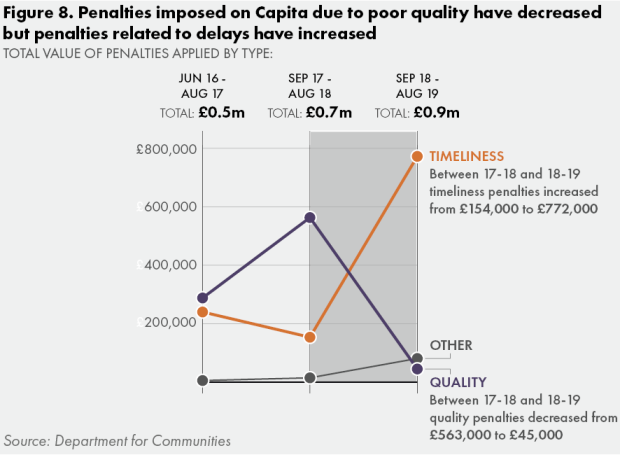
“The quality of the reports is not necessarily the same as the quality of assessments undertaken or judgements made, which creates the potential for a trade-off in actual assessment time against report writing time, within the overall time allocated to any assessment.” OBR, 2019
Capita requests mitigations if circumstances are outside its control
2.24 Capita may request that financial penalties are reduced or not charged if circumstances for not achieving performance were outside its control. In such cases, Capita must provide the Department with sufficient evidence to support its claim.
2.25 Capita may seek mitigations with supporting evidence on a ‘case by case’ basis or at a more strategic level. For example, financial penalties were not imposed when the Department took a strategic decision to prioritise processing new claims over DLA/PIP reassessments. Between June 2016 and September 2019, 60 per cent (367) of the 622 cases put forward for mitigation were accepted.
Capita regularly engages with stakeholders
2.26 Capita meets with stakeholders and the Department every quarter at the PIP Disability Consultative Forum. Matters discussed include the latest published statistics, progress on administrative exercises and issues or concerns raised by stakeholders.
2.27 Organisations also regularly liaise with the Department which has carried out various seminars and roadshows as a result. For example, the Department and the Law Centre (Northern Ireland) held a roadshow to advise deaf claimants how to complete their applications, prepare for their assessments and to explain the disputes process. The British Deaf Association (BDA) raised the issue of some claimants being awarded a blanket eight points for being deaf, with no account being taken of the fact that many of its members also had reading difficulties. Also, Capita had been using trainee interpreters due to difficulties in recruiting interpreters. This engagement allowed discussion of such issues with BDA members. Claimants were advised to contact the Department for their cases to be reviewed if their interpreter was a trainee.
2.28 Aside from its role in monitoring Capita quality, the HAA team may attend Capita Learning Days where stakeholders such as charities are brought in for education sessions for Capita IHPs and Department staff.
Capita assessors are often not trained to deal with specific conditions
2.29 In our engagement with stakeholders we have been told that claimants have raised the issue of IHPs not having sufficient expertise or knowledge of their condition, and in Part Four, we refer to feedback from claimants in respect of mental health expertise. The Rader Report recommended that enhanced training should be developed for assessors specific to certain groups of conditions. This recommendation was rejected by the Department because it does not consider the PIP assessment to be a clinical assessment involving diagnosis of conditions or the recommendation of options for treatment.
2.30 We note that the contract requires Capita to consider whether the consultation should be conducted by an IHP from a specific profession (for example, by a condition specific champion) or a health professional with particular skills and experience (for example, in mental health conditions). The Department has also advised us that Capita has a dedicated resource responsible for championing mental health who ensures that training materials and quality initiatives cover specific conditions. A number of the IHPs also have a background in mental health practice and act in an advisory capacity as well.
2.31 The Cavanagh Report has again raised the Rader recommendation on the need for assessors to have enhanced training. Given that this issue has now been highlighted by both independent reviews, in our view, this recommendation should be considered further by the Department.
65 per cent of respondents were satisfied with Capita’s face-to-face assessments
2.32 In January 2019, as part of its wider evaluation of the implementation of PIP and the overall welfare reform legislative changes in Northern Ireland, the Department published the results of an applicant survey. The survey looked at the effectiveness of its written communications, operational services, welfare supplementary payments, external support sought and satisfaction with the Capita assessment.
2.33 Nearly 6,000 applicants were contacted during the survey, after decisions had been made on their PIP claims. The response rate of 16 per cent was low. The majority of respondents were aware of the transition from DLA to PIP and were satisfied with the face-to-face assessment process. Where PIP was disallowed, 63 per cent of respondents considered the move from DLA to be unfair. Key findings are set out in Figure 9:
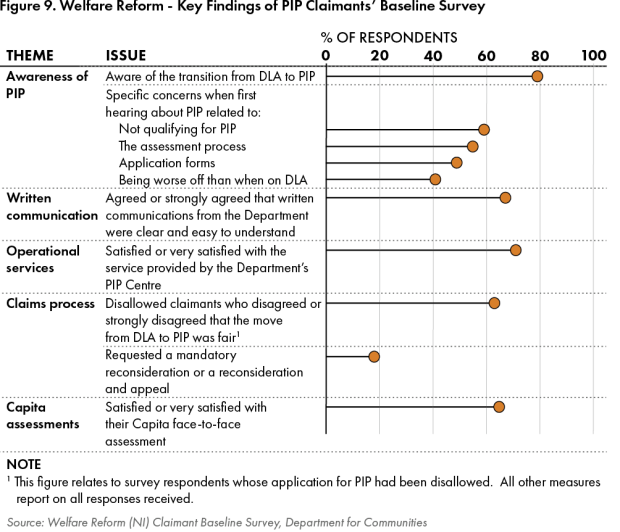
Capita’s target for addressing complaints is more challenging in Northern Ireland
2.34 Between September 2018 and July 2019, Capita received more than 1,000 complaints which it reports to the Department each month. As the NIPSO investigation has considered how Capita and the Department investigate and address complaints relating to further evidence, we have not considered this in depth but some further information is provided in Part Four. During this period, Capita consistently met its target of responding to complaints within 10 working days. We note that the target set by DWP is 20 working days and the reduction was requested by the Department.
The future of the PIP contract is being considered
2.35 Due to the challenges of responding to the impact of COVID-19, the Department’s planned procurement of health assessment services from August 2021 to July 2024 has been postponed. The Department intends to develop a business case to explore the extension of the current health assessment contracts by up to two years from August 2021 until July 2023. It also intends to develop a business case in early 2021 to explore how health assessment services will be delivered beyond July 2023.
Conclusion
2.36 There are always risks associated with introducing new programmes. The Department has had the benefit of learning from DWP’s experience and has worked closely with Capita in managing the contract. The Department has rolled PIP out broadly to timetable, and while Capita has met a number of its targets the key areas of quality and delivery remain challenging. We do note however that there have been recent improvements in performance against these targets and this is discussed further in Part Three.
Part Three: Delivery of PIP – Internal monitoring
3.1 In this Part we look at the Department’s internal monitoring of the delivery of PIP, mainly by analysing official PIP statistics published by the Northern Ireland Statistics and Research Agency every quarter. Where possible, we have also compared the position in Northern Ireland with that in GB.
All DLA (working-age) claimants have been invited for reassessment
3.2 Since June 2016, PIP has been rolling out across Northern Ireland. Initially it was rolled out for all new claimants and existing DLA (working-age) claimants reporting a change in circumstances. Since December 2016 the Department has been inviting the remaining DLA (working-age) recipients with indefinite (lifetime) awards to claim PIP (a process known as reassessment) and this was completed by mid-February 2019.
3.3 Nearly 229,000 claimants have registered a claim for PIP, with decisions taken on approximately 219,000 claims. These include 2,300 claims cleared by applying Special Rules for the Terminally Ill. By May 2020, approximately 146,000 claimants were in receipt of PIP, with around 74 per cent of these claims being reassessments. The process that a claimant undertakes when applying for PIP is set out in Figure 10.

The average time for clearing a PIP claim from start to finish is 13 weeks
3.4 The Department told us that the target for clearing PIP claims is 13 weeks, starting from when the claim is registered until the decision on entitlement is made. However the time taken by claimants to return their forms or provide FME may also have an impact. While we note there is currently no requirement to inform claimants when Capita staff are seeking FME, this update could be useful in letting claimants know where they are in the process. The issue of further evidence is being considered by the NIPSO in its Own Initiative Investigation (see Part Four for further details). In May 2019, following an upgrade of Capita’s IT systems in February, average (median) clearance times increased to 19 weeks but reduced to 14 weeks by May 2020. Average (median) clearance times have remained at 13 weeks since November 2018 (see Figure 11).
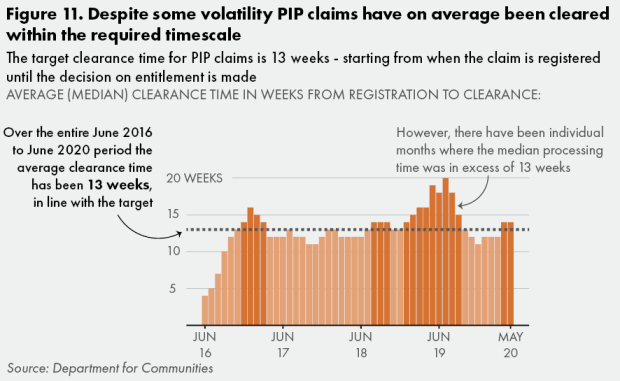
3.5 For GB in July 2020, average (median) clearance times were 23 weeks for a new claim and 28 weeks for a reassessed claim. DWP has partly attributed this increase to the introduction of a two-week extension to the time limit to return a PIP form where a reminder has been sent, and to how it has managed workload between claims, reassessments and reviews.
The average (median) clearance period between a claim being referred to Capita and a decision being made by the Department is 9 weeks
3.6 Following the IT upgrade, the average (median) clearance period for cases being referred to Capita and decided by the Department was 16 weeks, reducing to 13 weeks by May 2020. During the period June 2016 to May 2020 the average (median) clearance was 9 weeks. In GB, on average assessments were completed within 19 and 21 weeks for new and reassessed claims respectively.
Awards increased for 39 per cent of claimants and decreased for 41 per cent
3.7 The Department compared entitlements to DLA and PIP, at the time of PIP registration for reassessed claimants. Over three-quarters (78 per cent) of those who registered were awarded PIP. Thirty-nine per cent of claimants had their award increased and 41 per cent had their awards decreased or disallowed, which was not in line with the Department’s forecasts. Figure 12 shows the changes in award from October 2016 to November 2019.
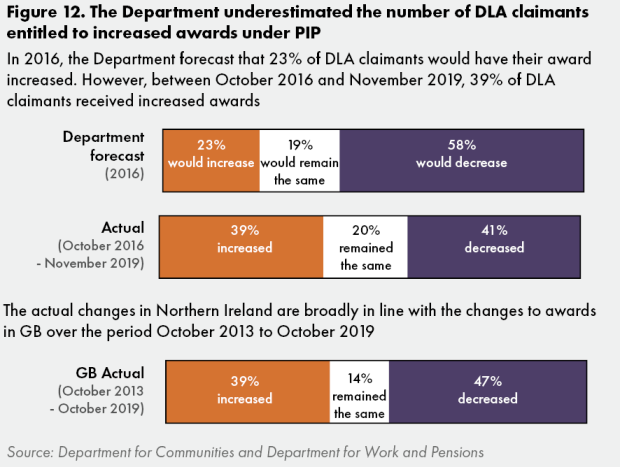
3.8 Disabling conditions leading to the highest increase in awards are blindness, learning difficulties and cystic fibrosis, in line with the position in GB.
34 per cent of DLA reassessments received PIP at the highest rate compared to 15 per cent for DLA
3.9 Thirty-four per cent (42,300) of reassessed claimants received both the enhanced daily living and mobility components. This compares with fifteen per cent (19,000) of DLA cases receiving both higher rate care and higher rate mobility DLA at the point of reassessment. In GB, from October 2016 to October 2019, twenty-nine per cent (412,596) of reassessed claimants received both the enhanced daily living and mobility components. Figure 13 provides further detail:
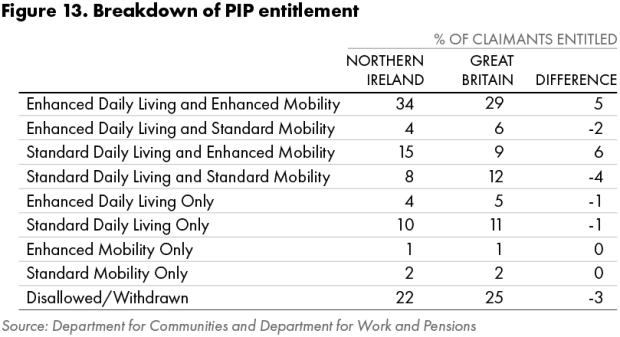
Over 61,000 claimants awarded PIP suffer from mental illness
3.10 The main disabling condition for claimants awarded PIP is mental illness, affecting approximately 61,000 claimants (42 per cent of claims) in May 2020. Next is musculoskeletal disease, affecting over 46,000 claimants (33 per cent of claims). This is similar to the position in GB where over 80 per cent of claims are due to mental illness, musculoskeletal disease, neurological disease or respiratory illnesses.
The majority of reconsiderations result in no change to the award
3.11 If claimants wish to dispute the decision on their PIP claim, they can ask the Department for a Mandatory Reconsideration (MR). In these cases, an independent Case Manager examines the information used to make the initial decision and any new evidence before formally reconsidering the decision. The Department may also instigate an MR if decisions need review, following Tribunal judgements.
3.12 By the end of May 2020, MRs were completed for around 60,000 (27.4 per cent) of 219,440 decisions taken. Twenty per cent of these MRs resulted in the award being amended which means that just over five per cent of awards to date have been changed (see Figure 14). The Department attributes this to FME being provided at the MR stage which was not available to the original Case Manager.
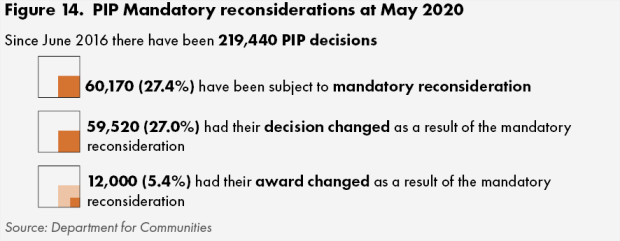
3.13 As noted in Part One, the Department started to reconsider all PIP applications made prior to 26 June 2018 (except for those already receiving the maximum rate) to establish if claimants were entitled to a higher rate of PIP because of the MH and RJ Upper Tribunal judgments (see footnote 25). The Department has stated in published statistics that this has led to a higher overall proportion of MRs resulting in no change to the award.
3.14 The Department does not currently publish MR clearance times although steps are being taken to expand the data reported. In GB, by the end of January 2020, 36 per cent of MRs led to changes in awards and the median clearance time was 48 days.
The Department has been publishing PIP Statistics since October 2017
3.15 Although PIP has been rolling out since June 2016, the first set of statistics was not published until October 2017. The Department acknowledges that there were initial delays in setting up the systems to transfer the information from DWP to the Department. Subsequently, complete data has been provided to the Department and statistics are being expanded.
The Department is performing well against internal measures of performance
3.16 The Department reports performance against operational internal performance indicators on a weekly and monthly basis. Quality Assurance Managers carry out accuracy checks on an ongoing basis and the Department’s Standards Assurance Unit (SAU) performs independent checks to identify any errors by Departmental staff or claimants every month. Outcomes of both of these checks are reported to the Department’s operational management team for information and action, if necessary. In a 2019-20 Report, Internal Audit noted that there are no checks over the data produced for the Key Performance Indicator tracking spreadsheet although work is ongoing to address this issue. See Figure 15.
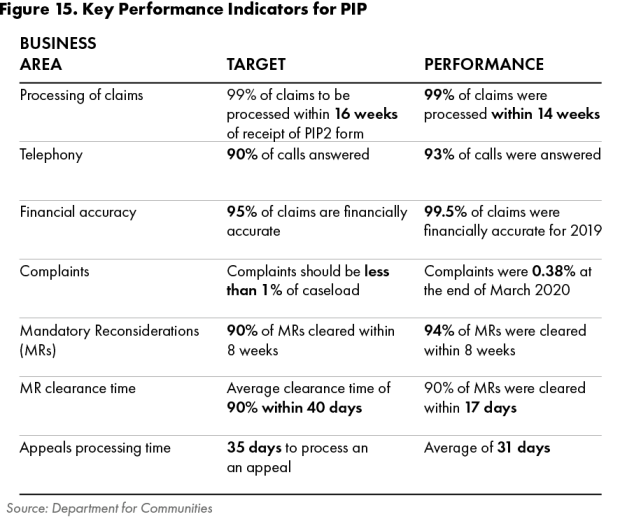
3.17 The Department is also required to establish two independent reviews of PIP and lay the reports before the NI Assembly. Further detail is provided in Part Four.
Part Four: Delivery of PIP – External indicators
4.1 In Part Three we looked at the Department’s internal monitoring of the delivery of PIP. This Part focuses on a number of external indicators, which provide further insight into the impact of the implementation of PIP.
Independent Reviews of PIP are a legislative requirement
4.2 The first Independent Review (the Rader report) was laid before the Assembly in June 2018 and made 14 recommendations, set out in Appendix 3. Ten of the 14 recommendations have been accepted or partially accepted by the Department, with eight of these implemented to date.
“It was positive to hear of some constructive practices which are already in place. However, the current PIP assessment process is viewed with distrust and suspicion.” Walter Rader, 2018.
4.3 The second Independent Review (the Cavanagh report) was laid before the Assembly in December 2020 and made 12 recommendations, including three of the previous Rader recommendations. Further details are provided in Appendix 3.
“It was positive to hear that some people have seen improvements to the process since the first Review. However, the current process is not a positive experience for everyone, and is still viewed by many with mistrust and suspicion. Evidence gathered during the course of this Review suggests more
work needs to be done.” Marie Cavanagh, 2020.
4.4 There has been a lot of public interest in recording PIP assessments and the Department partially accepted one of the recommendations in respect of this. Following the agreed pilot, the Department introduced the facility to audio record all clinic-based PIP assessments in November 2019 and over 600 have been recorded to date. There has also been over 80 audio recordings in claimants’ homes which will be offered to all claimants once COVID-19 social distancing restrictions are relaxed.
The Appeals Service arranges independent tribunal hearings
4.5 If, following a Mandatory Reconsideration, claimants disagree with the Department’s decision they lodge their appeal with The Appeals Service (TAS). TAS arranges independent tribunal hearings for a wide range of benefits including PIP. Although part of the Department, TAS is administered by the NI Courts and Tribunals Service (NICTS) and is an Agency of the Department of Justice (DoJ). While legislation has been in place since 2010 for the transfer of TAS to DoJ, it remains part of the Department. The President of TAS and the panel of tribunal members are appointed by the Lord Chancellor.
4.6 The Department told us that a service level agreement was established in 2012 which enhanced the independence of TAS, pending agreement on the statutory transfer of responsibilities to the Department of Justice. Both Departments are now updating the legislation to provide for the transfer of functions.
More than 11 per cent of PIP decisions have been appealed
4.7 Department statistics show that 217,000 claims for PIP were registered by the end of November 2019. We have assumed an increase of 2,500 claims in December 2019, in line with trends. Using the information provided in Figure 16, on average 11.5 per cent of decisions have been appealed to date compared to six per cent in GB. Of those appeals, nearly one-third have been overturned in favour of the claimant (successful) which represents nearly four per cent of all decisions made for PIP. This contrasts with GB where five per cent of initial decisions have been overturned. The Department told us that overturn rates for PIP appeals are in line with those for other larger comparable benefits. We note that the success rate for PIP appeals has increased since April 2019. The Department told us that, in the absence of formal feedback from tribunals, they have concluded that this was due to the appeals process having a larger proportion of DLA reassessment cases, which are historically more likely to have their appeal upheld.
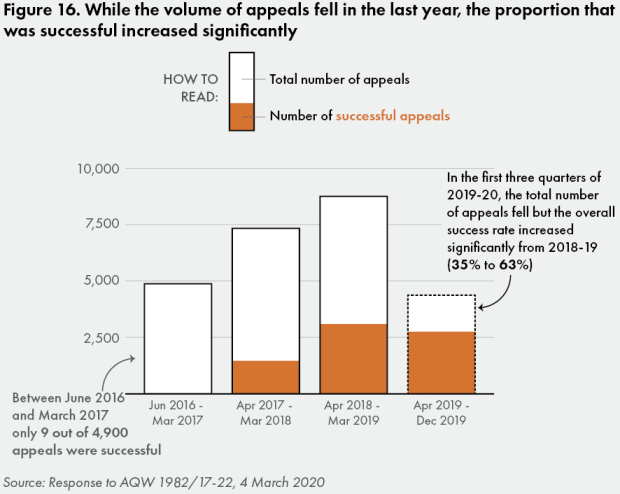
4.8 The Department has noted that the significant time lag between an appeal being lodged by the appellant and the final determination by the tribunal means there is no direct correlation between the number, and associated percentages, of appeals lodged and decisions made within the same year.
4.9 When claimants, previously in receipt of DLA, lodge an appeal, they are entitled to mitigation payments until the Department is notified of the outcome of the appeal, even if this takes longer than one year.
The majority of changes in decisions arise due to the provision of Further Medical Evidence
4.10 The Department attributes the majority of overturns of decisions at appeal to the tribunal panel receiving medical evidence not provided to its Case Managers. In some cases, it notes that the tribunal panel may also take a different view of the available evidence.
4.11 If the Department changes its decision because the claimant has provided FME before the hearing, the appeal may lapse. If the claimant accepts the changed decision, the Department notifies the tribunal panel that the appeal has lapsed and sends a copy of the new decision. Nearly 700 appeals lapsed in 2018-19.
4.12 If a tribunal panel requires FME from appellants to support their appeal, it may adjourn the case. Since April 2017, the tribunal panel has adjourned 7,338 cases for this reason, with 3,376 cases adjourned between April 2019 and December 2019.
4.13 While recognizing that PIP is a new benefit, in his 2019 report, the President of TAS highlighted the need for the Department to “carry out a more robust investigation prior to its initial decision” and noted that he had raised similar concerns about DLA decision-making and decisions being overturned due to the availability of FME. This report covers the period 2016-17, during which the Department’s decision was overturned in 23 of the 76 PIP appeals monitored. For most of the cases this was due to FME being received and in two cases, the Department’s decision was considered incorrect.
4.14 As noted in its response to Rader Recommendation 7, the Department accepts that, ideally, all relevant information should be available as early as possible in the process. Clearly, if appropriate medical evidence is available at the beginning of the process:
- the Case Manager is more likely to make the correct decision;
- the claimant does not suffer the unnecessary distress of going through the MR and appeals process; and
- the Department does not incur the additional costs of MRs and appeals.
The NI Public Services Ombudsman’s investigation has a focus on further evidence and complaints
4.15 Following the receipt of a number of PIP complaints and enquiries, the NIPSO is currently investigating the actions of the Department and Capita in administrating PIP, with a particular focus on the availability and application of further evidence in the PIP benefit decision-making and internal complaints processes. The NIPSO told us that it shared a number of observations with the Department in respect of some further aspects of the PIP process and complaints handling, which fell outside its terms of reference, in February 2020. As both the NIPSO’s review and the second independent statutory review have focused on the processes for gathering evidence, we have not explored this area in any further detail.
Feedback from the Appeals process is crucial
4.16 Understandably, the Department wants to learn from the appeals process and find out why the tribunal panel has overturned its decisions. There are three sources of feedback:
- the President’s Annual Report, which provides details on why tribunal panels have overturned PIP decisions by the Department;
- the summary sheet prepared by TAS, detailing points awarded in respect of each descriptor; and
- Presenting Officers, representing the Department at tribunals, who complete a template highlighting the reasons why they feel the tribunal panel overturned a decision and the evidence that was relied upon.
4.17 The Department reviews all feedback to determine if there are any lessons or actions they can take to address the quality of decision-making etc. Such issues are brought forward to bi-monthly PIP Quality Forum meetings and are also considered at senior management meetings. Issues raised about the quality of the assessment report are shared with Capita.
4.18 While the Department may write to the tribunal panel to obtain details of decisions, in practice this is only done if it intends to refer the case to the Social Security Commissioner on a point of law. The Department has advised us that it can take up to four months to receive these details.
There is room for improvement in the feedback process
4.19 Appeal tribunals are independent judicial bodies and we recognise their decisions and judicial functions are outside our remit. The most recent President’s Annual Report was published in 2019 and referred to appeals taking place in 2016-17. In his Report, the President reiterated the need for the Department’s Presenting Officers to attend on a more regular basis, which he considers would enhance the independence of the Tribunal, enable tribunal/appellants/representatives to question them about matters arising, prevent adjournments and secure feedback to the Department in individual cases. We asked the Department why this request has not been implemented and it told us this would be of limited benefit as the Presenting Officers are not party to the decision-making process.
4.20 The issues of optimising attendance of Presenting Officers at tribunals and the significant time lapse between the year end and the publication of the President’s Annual Report have been highlighted in previous NIAO reports in both 2005 and 2009. The Public Accounts Committee recommended that the President’s Annual Report should be published within six months of the end of the year to which it relates. While this recommendation was accepted by the Department, it is no longer considered achievable because the President of Appeal Tribunals NI has advised that the time taken to progress cases through the tribunal process would not facilitate this.
4.21 We understand that the President of Appeal Tribunals NI is willing to work with the Department to agree a suitable time frame which takes into consideration the allocation of first to final hearing dates for those appeals which are selected in the last two quarters of the relevant year. He is also willing to consider any recommendations that statisticians may have to achieve a statistically valid report in a shorter timeframe.
4.22 The summary sheet provided by TAS does not provide the rationale for the change in decision. In our 2009 Report we note that the President rejected the proposal to provide feedback on individual cases unless this was requested in writing in line with regulations.
4.23 Equivalent tribunals in GB provide feedback on individual cases for Employment and Support Allowance appeals. In 2014 an Independent Reviewer encouraged the Department and TAS “to continue to work together to better define the information that would be most conducive to improving decision-making without placing an undue burden on either organisation“. The Department told us that, as it has been unable to obtain detailed feedback from the Tribunal, it is difficult to ascertain why it reached its decision or how evidence has been weighted, which is essential if it is to be used to improve the effectiveness of the decision-making process.
Recommendation 2: While we recognise that attempts have been made to resolve these issues, it is disappointing that recommendations made 10 years ago by the Public Accounts Committee and ourselves relating to appeals have yet to be addressed. We reiterate the comments made by the Independent Reviewer of the Work Capability Assessment in 2014, that the Department and TAS need to work together to improve decision-making.
PIP Appeals have cost an estimated £14 million to date
4.24 The average PIP appeal costs £545 against an estimate of £341 and with 25,326 appeals to date, estimated appeal costs since April 2017 are nearly £14 million. The Department spent a total of £9 million on running the Appeals Service in 2018-19 and £7.65 million from April 2019 to December 2019. We asked the Department why actual costs have been so much higher than estimated. The Department advised that to comply with data protection regulations, TAS is no longer able to directly request Further Medical Evidence from General Practitioners or hospitals with appellant consent and is in the process of returning any information held. This has led to high postponement/adjournment rates and increased costs.
4.25 The average waiting time from receipt of appeal to final determination is 33.5 weeks, with an average of 24.5 weeks to the first date of hearing. Currently no targets have been set but the Department is working with TAS to develop them. We previously highlighted the need for end-to-end targets for DLA appeals in our 2009 Report.
Statistics on PIP appeals are not publicly available
4.26 The Ministry of Justice publishes official statistics relating to all tribunals, including social security, every quarter in GB but such information is not publicly available in the same detail in Northern Ireland. Since the return of the Northern Ireland Executive, 2.5 per cent of Assembly Questions to the Department refer to PIP appeals which, given the wide remit of the Department’s activities, provides an indication of the level of interest in these figures.
Recommendation 3: To achieve transparency and promote public confidence, detailed information on all tribunals (including social security) should be publicly available in NI as is the case in GB.
Some claimants have expressed confusion about providing Further Medical Evidence
4.27 As part of our previous report on welfare reforms we met a number of third sector organisations to discuss implementation across Northern Ireland. Given the significant number of PIP claimants with mental health issues, as part of this review we also met with a mental health charity and spoke to some of its members. Issues raised were similar to those highlighted in the Rader Report, for example:
- confusion about the need to provide Further Medical Evidence if already provided for DLA and the General Practitioner (GP) has it as “they are part of the same system”;
- their fear about going through the assessment process, especially given the negative perception;
- concern over how long they were having to wait and lack of clarity about response times;
- their view that the PIP application form had insufficient focus on mental health issues; and
- the general lack of mental health specialist knowledge among Capita’s assessors.
4.28 As such issues have been followed up by the second Independent Review we have not explored these issues further (see Appendix 3).
Advice at an early stage is crucial for claimants
4.29 The Law Centre NI (LCNI) provides advice to claimants and representation for PIP appeals, managing about 330 appeals every year. In its view, advice at an early stage is crucial for claimants to help them complete the claim forms properly. They advised of a number of successful cases where they had assisted the appellant in gathering additional medical evidence, for example, Employment and Support Allowance evidence and supporting letters from specialists with knowledge of the particular medical condition, which led to the case not going to tribunal.
4.30 LCNI acknowledges that it mainly deals with cases where issues have arisen. In its experience, claimants continue to document conditions rather than their impact and confusion still exists over whether claimants need to provide medical information or if the Department already has it. LCNI suggested that at decision-making or MR stage, it would be helpful if the Department set out in its correspondence what medical evidence had been considered in arriving at the decision, so claimants would know if they needed to provide anything further earlier or if any information provided had been misplaced. We asked the Department for its views on this suggestion and it advised that claimants can ask for an explanation call regarding the decision on their claim, which gives them the opportunity to ask about the evidence used and conclusions reached.
4.31 LCNI also highlighted appellants’ confusion about the change in the way medical records are requested and held, following the changes required to comply with data protection regulations. Appellants are now advised to provide Further Medical Evidence directly if they consider it will help with their appeal. The Law Centre noted instances where medical evidence was not accepted by tribunal panels as appellants had not removed confidential or sensitive information (and may not have been aware of how to do this). In September 2019 members of the Disability Consultative Forum noted that 75 per cent of appeals are adjourned for GP notes to be obtained, with instances of information being requested for three years. The Department has advised that this issue is outside its control as tribunals are independent.
4.32 In our view, it is likely that claimants receiving assistance from voluntary and community bodies when going through the PIP process will be making fewer appeals. The Department told us it has not conducted any analysis to support this assumption and that it currently funds the advice sector to provide advice on a wide range of issues, including all social security matters, to support citizens in claiming the benefits they are entitled to.
Concerns have been expressed about how regulatory bodies have handled complaints
4.33 In April 2019, the Professional Standards Authority for Health and Social Care (PSA) published its review of the Nursing and Midwifery Council’s (NMC) performance in 2017-18 and expressed “concerns about how the NMC handled complaints raised about registrants who have conducted PIP assessments”.
4.34 The PSA “considered that the NMC did not systematically consider all the concerns raised by complainants, relied on the views of employers as reasons to close cases without proper scrutiny and did not obtain sufficient evidence to reach its decisions.”
4.35 The NMC advised PSA that it has since taken action that includes additional training for those making and communicating case decisions, as well as a new quality assurance approach to the way it initially reviews cases.
Part Five: Has the PIP Contract been managed in line with good practice?
5.1 In this Part, we assess how the Department has managed the PIP contract against the National Audit Office’s ‘Good practice contract management framework’. This framework focuses on the activities that organisations should consider when planning and delivering contract management and is of particular relevance to service contracts such as this. It has been used elsewhere across government.
5.2 In its report, the NAO acknowledges that while implementation of the tasks set out in its framework help improve contract management, achieving them may not be enough to achieve value for money. It goes on to say:
“Contract success and failure depends as much on the soundness of the commercial strategy, the client’s capability, and the robustness of the procurement as it does on the management of the contract”.
5.3 The good practice framework defines four blocks that comprise 11 areas for organisations to consider, and is shown in Figure 17:

Structure and Resources: Area 1: Planning and Governance
Contract ownership and management is clear
5.4.1 The Department appointed a Senior Responsible Officer (SRO) for the PIP Project, responsible for ensuring objectives were met and benefits realised. The appointed SRO continued to be involved in operational management until all claimants were invited for reassessment. As many of the staff who implemented the Project are now delivering PIP, this has led to knowledge transfer and continuity.
The Department’s Commercial Services team is responsible for managing the commercial aspects of the contract. Wider contract management activities are also carried out by:
- the Health Assessment Advisor (HAA) and her team who manage the clinical quality of Capita assessments;
- Departmental Case Managers who make decisions on claims, based on Capita assessments; and
- the Department’s Capita Liaison Manager who receives management information from Capita and operational requests for financial penalties not to be imposed, if circumstances have been outside Capita’s control.
Performance is reported through an established governance structure
5.4.2 Roles and responsibilities are set out clearly for both the Department and Capita in the contract. It is evident from our meetings with them that they have a constructive working relationship, facilitated by geographical proximity. As noted in Part Two, a number of Boards have been established to manage the governance and performance of the contract.
Structure and Resources: Area 2: People
The contract management teams have appropriate resources
5.4.3 To manage contracts effectively, the Department needs to have enough people with the right skills. Staff in the Commercial Services team have either been trained or are in the process of being trained. The contract manager has had extensive training in areas like contract management, commercial negotiation and tender evaluation. He also has experience of managing other contracts and is able to share good practice with peers and learn from them. The team also works closely with equivalent DWP colleagues and is able to learn from and utilise their experience. After a period of stability within the team there have been four different contract managers during the review. We recognise that the outgoing contract manager has been in Commercial Services throughout this period and has a handover period with the new manager. The importance of robust handover arrangements, particularly for such a significant contract, was recognised in the recent Renewable Heat Incentive (RHI) Report.
The HAA and her non-administrative staff all have clinical backgrounds.
Balanced contract management teams are in place with the appropriate range of skills
5.4.4 The Department has invested in its quality management teams, who check the decisions made by Case Managers. The level of checks reduces as the latter gain experience, for example, all of a Case Manager’s work is checked until they are fully trained.
The Department has advised us it is committed to continuous improvement and balancing the checking of processes with assurance over assessments. For example, now that the PIP process is embedded, staff grades have been revised to reflect risk and the number of quality meetings has reduced.
The Department is planning to enhance its clinical quality management function
5.4.5 The Department is planning to expand its HAA function. Respective advisors in GB attend some assessments as observers and Capita has provided the Department with feedback from their experience of this process with DWP. This was not initially replicated in NI due to capacity constraints. HAA staff have been attending a sample of assessments, since February 2020. Following COVID-19 social distancing restrictions, staff have been ‘attending’ telephone assessments.
The Department told us that no significant issues have been identified to date and any areas for improvement have been dealt with promptly by Capita.
Structure and Resources: Area 3: Administration
Capita provides information to manage the contract
5.4.6 The Department has an agreement with DWP, a cost saving measure allowing NI to use systems developed by DWP at no cost to the Department. As noted in Part Two, both DWP and the Department rely on information provided by Capita to manage the contract.
Capita has a contractual obligation to ensure that all management information delivered to the Department has been validated, is accurate and fully auditable. In early 2014, the NAO highlighted DWP’s reliance on Capita’s management information as a shortcoming and viewed it as an interim measure. Seven years later, the position has not changed and the Department continues to rely on DWP to develop IT systems. The Department told us that DWP is developing the Health Transformation Digital System to replace both the incumbent PIP IT system and the Work Capability Assessment IT system and it is intended that this system will be in place for August 2023.
The Department works closely with DWP
5.4.7 Departmental staff were actively involved and contributed to the procurement process with DWP. They also attend various DWP Governance Forums, which provides the Department with the opportunity to understand and contribute to decisions. The Department told us that its staff also regularly engage with their GB counterparts to keep up-to-date with developments affecting Northern Ireland, share information on various contractual issues, for example, COVID-19 arrangements, contract variations, mitigation requests, and discuss any concerns.
Recommendation 4: It is acknowledged that, in line with DWP practice, the Department has been relying on Capita to produce management information systems for this contract. In future contracts, the Department should have a robust information system in place for managing contract performance, rather than relying on the contractor to provide key information.
Delivery: Area 4: Managing Relationships
Communication with Capita is both structured and informal
5.5.1 Aside from the formal meetings (see Part Two) and bi-monthly meetings attended by Capita’s Clinical Governance Team and the Department’s HAA, there are also a number of informal arrangements in place, for example, quarterly meetings between HAA and Capita’s Learning and Development team, where Capita reports on the training provided to its IHPs to meet their Continuing Professional Development (CPD) requirements.
Stakeholders are involved in contract management processes
5.5.2 Capita regularly engages with a range of stakeholders, for example, the quarterly PIP Disability Consultative Forum attended by operational PIP staff, Capita staff and advice groups, and takes on board issues or suggestions raised by them. Capita also invites various charities to attend training sessions for its IHPs, to gain an understanding of various conditions and explain their role. Capita told us that the Samaritans have trained its Enquiry Teams to deal with vulnerable callers, and reception staff at assessment centres have received basic training in sign language.
Delivery: Area 5: Managing Performance
A comprehensive performance management framework is in place
5.5.3 As outlined in Part Two, the Department’s performance management framework is comprehensive and provides incentives for Capita to meet or exceed agreed performance standards.
Delivery: Area 6: Payments and incentives
Open book pricing mechanisms are used and the process is managed professionally and fairly.
5.5.4 Following the contract review, the contract now includes an open book accounting clause that allows the Department to audit Capita’s accounts at any time and requires them to provide quarterly financial information on an annual basis. A 50/50 profit sharing mechanism has also been introduced, with Capita required to pay the Department a share of any profits above an agreed threshold which is then validated.
Delivery: Area 7: Risk
The Department monitors Capita’s financial health and performance
5.5.5 Capita holds a significant number of high value contracts across the public sector. As a result, the Cabinet Office assesses both its financial health and performance across government and provides biannual updates to the Department.
Contingency plans have been developed to manage supplier failure
5.5.6 A contingency has been built into the contract to address temporary or long-term failure or default. The contract allows the Department to terminate the contract under certain circumstances and award it to another supplier. A clause was also inserted into the extended contract to ensure that the Department is protected if there are indications that Capita is facing financial distress.
Development: Area 8: Contract Development
The Department reviews the contract regularly to ensure it meets evolving business needs
5.6.1 The Department has demonstrated a commercial approach in its dealings with Capita. While PIP has been rolled out, the Department has monitored and managed the volume of claims by analysing claims to date and preparing revised forecasts for Capita. Where Capita has not delivered the forecast number of claims due to resourcing pressures, the Department is entitled to impose financial penalties per the contract. However, if circumstances are outside Capita’s control, significant backlogs may develop with claimants having to wait longer for the outcome of decisions. This situation arose in GB where some claimants waited as long as six months for decisions to be made. As a result, when Capita encountered resourcing issues in February 2017, the Department delayed the roll-out of reassessments.
The Department told us it exercised its right to ‘Step In’ per the contract on 17 March 2020 and asked Capita to temporarily suspend all face-to-face assessments in response to the COVID-19 pandemic.
There are clear processes for the management of minor changes and contract variations
5.6.2 During the contract the Department may give written notice to Capita of a change to the contract, for example, the addition of a new service or operational process. The Department also has to consider the implications for NI of any changes proposed by DWP. The Commercial Services team discuss all proposed changes with relevant Departmental staff. Since the initial award of the contract there have been nine variations to the contract specification. The first was the most significant and followed the contract review in June 2017, a year after PIP began to be rolled out in NI. Significant contract variations require approval by senior management.
A number of NI change requests have been made to support the introduction of audio recording of assessments, a recommendation from the last Independent Review as noted in Part Four.
The Department does not formally benchmark services provided with DWP
5.6.3 Management information provided by Capita is not shared between the Department and DWP as their contracts are independent of each other and Capita considers this information to be commercially sensitive. The Department advised that as both departments communicate regularly, they have an understanding of performance within each Lot and consider benchmarking to be of limited value, as individual Lots are not directly comparable.
While fixed costs for setting up contracts are broadly similar for NI and GB, the significantly higher volume of assessments and the more competitive market has contributed to the cost per assessment being lower in GB. Conversely, the lower volume of assessments in NI has also resulted in quality being more consistent.
Capita and the Department have told us they have a good working relationship which they attribute to the fact that they are geographically more accessible to each other in NI and meet regularly. Capita told us that they internally compare performance data in each Lot and use this to identify areas for improvement.
Recommendation 5: We accept that there may be some differences between the PIP contracts operating in GB and NI. In our view, it would be good practice for future contracts to allow for the formal sharing of information for benchmarking purposes, which should help improve performance.
Development: Area 9: Supplier development
Capita is required to demonstrate continuous improvement
5.6.4 Capita is required to provide a programme of continuous improvement and reports progress at the quarterly Executive Management Board meetings. Matters reported include progress on key improvement initiatives, for example, allocation of work to IHPs, the level of stakeholder engagement and new quality improvements, for example, on report writing.
The Department’s Health Assessment Advisor function also reviews Capita’s training needs analysis, training plan and delivery of its training programme to ensure that CPD is maintained for all IHPs who complete assessments.
Strategy: Areas 10 and 11: Supplier relationship and Market management
5.7. While there is no formal supplier relationship management programme, as noted earlier staff throughout the Department widely engage with Capita staff. Also, as part of its terms of reference, the Annual Review Board considers the overarching supplier/contractor relationship.
The Department has followed the procurement route adopted by DWP to maintain continuity of service and minimise additional costs from developing and maintaining independent IT systems. While contracts have been locally tailored for each Lot, the Department is heavily reliant on DWP to take the lead, particularly in areas like IT development.
Conclusion
5.8 The Department is very dependent on DWP for the implementation and delivery of PIP. It continues to use DWP benefit systems to maintain parity and provide the same service to Northern Ireland claimants as is available to GB claimants. By doing so, it also saves the expense of developing and maintaining its own systems. Furthermore the Department has also been able to draw on the experience of DWP and avoid the initial problems it experienced. This has led to a smoother implementation of PIP in Northern Ireland than in GB and more robust contract management from an early stage. The downside of this arrangement is that the Department has less control over how DWP develops the contract and strategy and can therefore only influence through close engagement.
5.9 We have seen evidence that the Department considered key areas such as structure and resources, delivery and development when managing the contract.
5.10 The fact that Capita provides the Department with the information used to assist it in managing Capita’s performance is not good practice, nor is the lack of formal benchmarking between the contracts despite some differences in terms. Aside from these issues, in our view the Department has managed the PIP contract in line with the NAO’s good practice framework.
Appendix One: Methodology
Our approach included:
1. Review of research documents to understand various aspects of PIP and its impact in Northern Ireland and elsewhere in the UK, for example, reports by the Northern Ireland Human Rights Commission and Westminster Public Accounts Committee.
2. Review and analysis of key documents produced by the Department, including contract documentation.
3. Analysis of statistics on PIP published by the Department for Communities and the Department for Work and Pensions to inform our report.
4. Stakeholder engagement:
- meetings with organisations from the third sector (Aware NI) and the advice sector (Law Centre (NI));
- use of feedback obtained from engagement with the third sector and advisory bodies for our 2019 Welfare Reforms report;
- meetings with various officials in the Department for Communities in the PIP Centre (Case Managers, Mandatory Reconsideration Case Managers, Quality Assurance Managers), the Health Assessment Advisor and PIP Commercial Services team;
- meeting with Capita senior management including the NI Client Engagement Director;
- liaison with staff in the Northern Ireland Public Services Ombudsman (NIPSO) involved in their ‘Own Initiative’ Investigation;
- meeting with Marie Cavanagh, appointed by the Department for Communities to carry out the second independent Statutory Review of the PIP assessment; and
- liaison with colleagues in the NAO to provide us with an overview of how PIP has progressed elsewhere in the UK.
Appendix Two: Comparison of DLA with PIP in Great Britain (para 1.4)

Appendix Three: Recommendations from the Independent Reviews (para 4.2)
Recommendations by Walter Rader in June 2018 and interim Department response in November 2018
|
Recommendations |
Accepted/not accepted by the Department |
Extract from Department comments in its interim response |
|---|---|---|
|
1. Awareness of the PIP Process That the Department, in conjunction with advice and thematic support organisations, coordinates a series of information and outreach events across Northern Ireland. The aim of such events would be to assist and support claimants, their family members and support workers to have a clear understanding of the PIP assessment process and purpose. Such events should aim to clarify the type of relevant information which is required in support of a claim and when it should be submitted. |
Accepted |
The Department has been coordinating a series of events beginning January 2019. The Department has also developed a series of supporting videos focussing on key messages relating to particular stages of the PIP process. The Department will continue to engage with key stakeholder groups. |
|
2. Terminology used in the PIP Process That the Department updates the terminology used to describe roles and functions throughout the PIP assessment process and simplifies and consolidates the terms used in advice and guidance documents. Particular care should be taken to ensure that the terms, words and titles used do not misrepresent the roles undertaken, or the nature of the PIP assessment process. |
Accepted |
The Department has started a review of terminology used throughout the PIP process; DWP intends to commission independent research to support improvements to the PIP2 questionnaire which the Department will consider when reviewing any revised literature. |
|
3. Use of DLA Evidence The use of DLA evidence to support reassessment cases should cease. |
Not accepted |
Whilst the Department accepts that the relevance of DLA evidence to PIP claims varies on a case-by-case basis, it is conscious that this evidence has been relevant in a proportion of cases. |
|
4. The Assessment Process (A) The Department should review written material particularly (i) The initial letters to claimants (ii) The subsequent decision letters to claimants, ensuring clarity of message and the avoidance of jargon (B) The Department should develop simple straightforward material describing the PIP assessment process. |
Accepted |
DWP is currently examining the PIP application process. As a user of DWP IT system, the Department will be a key stakeholder in the review of literature as part of this work. Reviews will be discussed with stakeholders at the regular meetings of the Disability Consultative Forum. |
|
5. Applying for PIP (A) That the Department ensures there are suitable, accessible options for those with particular needs such as communication requirements, including those with visual and hearing impairment, as well as those who cannot hand write, to allow them to apply for PIP where telephone and hand written completion of PIP forms is not suitable. (B) That the Department reviews the training provided to staff ensuring that awareness is raised regarding the options available for claimants who find it challenging or impossible to communicate by telephone. |
Accepted |
Claimants can apply primarily by telephone and there is also a text phone service. If a claimant has difficulty using these channels then a paper claim form can be requested. Alternatively, a claimant can provide consent, either verbally or in writing for a nominated person to make a claim on their behalf. Telephony staff will be provided with an accessibility options desk aid. Capita has fully trained sign language interpreters. DWP are currently piloting on-line applications. |
|
6. Claims made under Special Rules That the clinical judgment of a medical practitioner, indicating that the claimant has a terminal illness, should be sufficient to allow special rules to apply. The 6 months life expectancy criterion should be removed. |
Cannot implement |
It is for the incoming Minister to determine if they wish to initiate any review of the current arrangements in place for the special rules in Northern Ireland, taking account of the position in GB. |
|
7. Further Evidence So that relevant up-to-date medical information is available early in the PIP assessment process, the Department should reach agreement with the relevant professional bodies as to how they may best obtain a GP Short Summary Report to support the PIP2 submission. This should be requested for every claim. |
Partially accepted |
The Department accepts that, ideally, all relevant information should be available as early as possible in the process. The Department notes the misconception of the PIP functional assessment as a medical one. DWP are exploring options for confirming the medical history in advance of the functional assessment and the Department is tracking this work. The Department is also engaging with the British Medical Association to consider how a General Practitioner short summary report can be provided in a timely manner. |
|
8. Receipt of Further Evidence The Department should introduce steps to ensure that Capita are made aware, as early as possible in the process, when additional evidence is received with the PIP2 and advised that it will follow. Capita should be afforded time in the process to await any additional evidence. |
Accepted |
The Department has introduced new processes to address this issue. |
|
9. The Initial Review The Department should establish a short term ‘Task and Finish’ group, involving stakeholder organisations and medical experts, to develop a set of criteria detailing which conditions would be more appropriately addressed through the Paper-Based Review Approach. This should cover conditions with no prospect of improvement and/or with life limiting implications. It could also cover those who face challenges representing their condition and functionality in the face-to-face assessment. It will be vital to set out clearly the relevant information and evidence which would be required to permit an assessor to complete a Paper-Based Review in these cases. |
Partially accepted |
It may not be in the best interest of the claimant to place limitations on the evidence gathering process. A significant number of claimants have more than one condition or disability. However as a result of the review the Department has examined how the initial review is conducted. The decision making matrix has been enhanced and will be discussed with stakeholders at the Disability Consultative Forum. |
|
10. Appointments and the Assessment Centre The Department should urgently address the issues raised by claimants. This includes but is not limited to:
|
Accepted |
The process has been enhanced to allow front line Capita staff more flexibility to reschedule appointments. Appointments can now be subject to enhanced manual scheduling by Capita staff bypassing the scheduling system to address claimants particular issues around dates and times. Reasonable adjustments identified at the initial review stage will be put in place by Capita and an appointment issued. When it is necessary to cancel appointments Capita will make every effort to advise the claimant at the earliest opportunity. |
|
11. Disability Assessors /Independent Health Professionals The Department and Capita should develop enhanced training for assessors specific to certain groups of conditions, which could be informed by the prevalence of those conditions as recorded in the Departmental statistical analysis. If a claimant indicates, and can prove, they are affected by one of these conditions they should have the opportunity to see an assessor with enhanced training relevant to their condition, or to have a Paper-Based Review. |
Not accepted |
The PIP assessment is not a clinical assessment involving diagnosis of conditions or the recommendation of options for treatment. The Disability Assessor (DA) engages objectively with the claimant to record any information that clearly explains the functional effects of the reported conditions. DAs have received extensive training and continual learning and development. The Department considers them appropriately trained to carry out the PIP functional assessment. |
|
12. Accuracy of Assessor’s Reports The Department should introduce audio-visual recording of assessments in both home and assessment centre locations. |
Partially accepted |
DWP intends to pilot video recording of assessments in line with a Ministerial decision and the Department is tracking progress. The Department will also carry out a pilot of audio recording in NI. |
|
13. Questions asked and observations made during assessments (A) The Department, in conjunction with the assessment provider Capita, should remove or revise the use of informal observations to support assessor’s reports. If revised, the assessor should be required to justify the conclusions which they have drawn in their observations. (B) The Department and Capita should remove all questions about suicide and self-harm from the assessment. If they deem this information as essential they should source it in an alternative manner. |
Accepted Partially accepted |
The Department will continue to use informal observations as part of the PIP assessment process but accepts that it is critical that these are factual observations and not opinions. The Department discussed with Capita how questions regarding suicide and self-harm should not be asked unless raised by the claimant in the assessment or included in the PIP2 questionnaire. New guidance has been developed and put in place from October 2018. The assessment process does not include mandatory questions in relation to suicide or self-harm, however, if the claimant is identified as expressing these issues it is essential that the Capita staff are in a position to sensitively explore this issue to ensure claimant safety and that the appropriate relevant evidence is gathered. Alternative sources of information have proven to be unsuccessful due to constraints on those health professionals who may be in a position to support. |
|
14. Provision of Assessor’s Report The Department should put in place arrangements for a copy of the assessor’s report to be made available to claimants along with their decision letter. |
Not accepted |
DWP has undertaken to improve PIP communications to highlight to claimants that they can request a copy of their assessment. The Department expects to introduce the same improvements. |
Recommendations by Marie Cavanagh in December 2020
The Cavanagh Report made twelve recommendations which the Department will be responding to. It also provided further updates on the progress made in implementing the earlier Rader recommendations. A summary of the recommendations is noted below:
Recommendation 1: Communications and Accessibility
To improve accessibility for those claiming PIP, the Department, in consultation with stakeholders should explore and develop alternative methods of communication and improve existing communication products and information.
Recommendation 2: Claiming PIP
a. The Department should establish a “Task and Finish” group, involving stakeholders and Medical Professionals, to look at the PIP2 and AR1 forms. This group should consider, but not be limited to a number of points…
b. The Department should raise awareness about the availability of the two week extension which can be requested for returning the PIP2/AR1 form.
Recommendation 3: Special Rules Terminally Ill
Given the substantial supporting evidence gathered during the second Review, the Review recommends the Department revisits Recommendation 6 from the first Review that the 6 months life expectancy criterion for terminally ill claimants should be removed and replaced with a system based on clinical judgement similar to that enacted by the Social Security (Scotland) Act 2018. This should include adopting a subsequent 10 year light touch review on awards made where special rules apply.
Recommendation 4: Assessment Type
a. The Department should consider the use of new methods of Assessment, embracing the full range of technology available. This should include use of telephony or audio-visual method where available and should also include a range of options from which the claimant can choose in order to best suit their needs.
b. In the interests of transparency, the Review recommends that the Department’s position should be that all Assessments are audio-recorded with the claimant given the option to opt-out.
Recommendation 5: Assessment Process
To support claimants and Healthcare Professionals to navigate the Assessment process, and to improve the provision of information available and transparency of the process, the Review recommends that the Department take a number of steps…
Recommendation 6: In-House Assessment Providers
The Department should consider the outcome of the DWP pilot to bring Assessments for both Work Capability Assessment (WCA) and PIP Assessment in-house. The Review recommends that the Department conduct a similar pilot in NI.
Recommendation 7: Further Evidence
a. The Department should produce guidance/examples for claimants, advocacy services and Healthcare Professionals of appropriate evidence to support the PIP process and where this evidence should be obtained.
b. The Department, in conjunction with Capita and relevant Healthcare Professionals, should examine and implement new ways to improve the current poor return rate of GP factual reports.
c. Proper consideration and recording of evidence when making decisions is essential. All evidence needs to be carefully considered, in relation to the particular circumstances of the individual case, to ensure the correct decision is reached. The Department should ensure the evidence is fully documented and that further evidence, medical or otherwise, has been correctly weighted and documented.
Recommendation 8: Disability Assessor (DA) Training
Given the substantial supporting evidence gathered during the second Review, the Review recommends the Department revisits Recommendation 11 from the first Review and implements the Recommendation, taking into consideration four factors…
Recommendation 9: The Audit Process
a. The Review recommends that the Department bring all auditing functions in-house as this would go some way to improving trust in the auditing process.
b. The Review recommends that the Department’s Health Assessment Advisor (HAA) uses the audit process and observations to identify the conditions/disabilities where DA’s require enhanced training. This should be regular, updated and kept under review. The Department’s HAA should engage with expert organisations and Medical Professionals to deliver the condition specific awareness/training required.
c. The Review recommends that the Department appoint an Independent Panel to scrutinise and provide support mechanisms for reviewing the standard of Assessment, quality of reports, outcomes from the audit process and incorporate any learning identified.
Recommendation 10: Decision Making
a. The Department should ensure that Case Managers are empowered to carry out their role as Decision Makers and amend descriptor choices, recommended by Capita, if they have evidence to support this.
b. The Department should ensure that the process for renewing a claim for PIP is the same for all claimants. The current process means that those without a review end date have to complete the new claims process rather than the shortened AR1 form.
c. The Department should ensure on-going awards are made on all cases where the claimant’s condition is lifelong, life-limiting or degenerative. This should include adopting a subsequent 10 year light touch review on awards made.
d. Given the substantial supporting evidence gathered during the second Review, the Review recommends the Department revisits Recommendation 14 from the first Review and provides a copy of the DA’s, including audited versions, to claimants along with their decision letter.
Recommendation 11: Improvements to the Complaints Process
a. The Department and Capita should publish more comprehensive guidance on how the complaints process works. More comprehensive guidance will help allay fears and assure claimants that making a complaint does not impact or influence the final decision.
b. The Department should establish an Independent Panel to monitor and scrutinise complaints and responses from the Department and Capita. This will remove any mistrust around effective complaint handling.
Recommendation 12: Improvements to published statistical information
The Review recommends that the Department provide in-depth statistical data in line with DWP published information to promote confidence and transparency.
Appendix Four: Department Response to the impact of the COVID-19 pandemic on PIP (para 2.35)
The Department has been providing regular updates on the impact of COVID-19 on its services and what it means for claimants on its website, through emails and communication with advice bodies. Department staff at various levels have been engaging regularly with the voluntary and community sector. Additional information has also been published on NI Direct. The Department has also set up a Freephone COVID-19 Helpline to assist vulnerable claimants in accessing information, advice and guidance.
Since restrictions were imposed:
- face-to-face PIP assessments have been suspended;
- PIP assessments are being carried out by telephone or through considering medical evidence submitted by post;
- new award reviews and reassessments for PIP have been suspended, with awards being automatically extended;
- time for submitting PIP2 forms has been extended;
- restrictions on the advice sector signing application forms on behalf of claimants have been eased;
- Capita staff have received teleconferencing training;
- face-to-face PIP appeals have been delayed; and
- Capita intends to carry out paper-based reviews for those claimants who they consider may be restricted through the use of telephony assessments.
The Department has had to find new ways of working while at the same time ensure social distancing measures amongst its own staff, deal with an unprecedented demand for its services and do so with fewer staff. Understandably, operational delivery has been prioritised and a number of business priorities have been delayed as a result, for example:
- the Budget 2020 announcement that PIP claimants will not have an award period of less than 18 months, which has not been implemented in GB;
- the Gateway Review on benefits realisation;
- progress on administrative exercises;
- rolling out of audio recording of assessments (not possible for telephone appointments); and
- the review of independent advice services commissioned from the Strategic Investment Board.